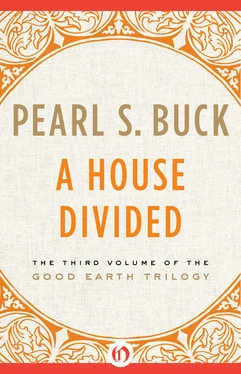So on a certain day Yuan went with Meng, and though he kept his face straight and calm, his heart was doubtful.
Yet when he had walked through a gate at which guards stood, very cleanly and bravely dressed, their guns shining and ready in their hands and through courts cleaned and ordered, and when he went into a room and saw the general there, sitting at a table, he need not have been afraid. In a moment Yuan saw this old tutor of his would not call to speech any old grievance against him. He was older than when Yuan saw him last, and now a known and famous leader of the armies, and although his face was not smiling or easy or lenient, yet it was not an angry face. When Yuan came in he did not rise but nodded his head towards a seat, and when Yuan sat edgewise on it, for he had once been this man’s pupil, he saw the two sharp eyes he remembered gazing from behind the foreign spectacles, and the harsh voice he remembered, which was not unkind nevertheless, asked him abruptly, “So now you have joined us, after all?”
Yuan nodded and as simply as he used to speak when he was a child he said, “My father pushed me to it,” and he told his story.
Then the general asked again, looking at him very keenly, “But still you do not love the army? With all I taught you, you are not a soldier?”
Yuan in a little of his old confusion hesitated and then decided willfully he would be bold and not fear this man and he said, “I hate war still, but I can do my share in other ways.”
“What?” the general asked, and Yuan replied, “I shall teach in the new great school here for the present, for I have need to earn, and then I shall see how the road opens.”
But now the general grew restless, and he looked at a foreign clock that was on his desk, as though his interest was no more in Yuan if he were not a soldier, and so Yuan rose, and waited while the general said to Meng, “Have you the plans made for the new encampment? The new military law calls for an increase of men levied from each province, and the new contingents come in a month from today.”
At this Meng struck his heels together, for he had not sat in his general’s presence, and he saluted sharply and he said in a very clear proud voice, “The plans are made, my general, and await your seal, and then they will be carried out.”
So was the brief meeting over and Yuan, for all his old distaste which rose up in him strongly as he passed between many soldiers who now filed in from grounds where they had been practicing their ways of war, yet could not but see these men were different from his father’s lounging, laughing followers. These were all young, so young that half at least were less than twenty. And they did not laugh. The Tiger’s men were always full of brawling and of laughter, and when they straggled home to rest after practice they pushed each other in rude trickery and shouted and made jokes, so that the courts were full of rough merriment. Daily in his youth Yuan knew the hours for meals because he heard guffaws and curses and loud laughter outside his inner court where he lived with his father. But these young men came back silently, and their footsteps were in such solemn unison the sound was like a great single footstep. There was no laughter. Yuan walked past them, soldier after soldier, and he saw their faces, all young, all simple and all grave. These were the new armies.
That night he wrote to Mei-ling, “They looked too young to be soldiers and their faces were the faces of country boys.” Then he thought awhile, remembering their faces, and he wrote again, “Yet they had a certain soldier’s look. You do not know it, for you have not lived as I have. I mean their faces were simple, so simple that I knew, looking at them, they can kill as simply as they eat their food, — a simplicity fearful as death.”
In this new city Yuan now found his own life and share. He opened at last his box of books and placed them in some shelves he bought. There were also the foreign seeds he had grown to fruition in the foreign country. He looked at them doubtfully, each kind still sealed in its packet, questioning himself how they would grow if he planted them in this darker heavier earth. Then he tore one packet open and shook the seeds into his palm. They lay in his hand, large, golden, waiting grains of wheat. He must find a bit of land in which to try them.
Now he was caught in a wheel of days and weeks and months, each following swiftly after the last. His days were spent in the school. In the morning he went to the buildings, some new, some old. The new buildings were gaunt grey halls, foreign-shaped, built too quickly of cement and slender iron rods, and already flaking into pieces, but Yuan had his classrooms in an old building, and since the building was old the leaders of that school would not so much as mend a broken window. The autumn drew out long and warm and golden, and at first Yuan said nothing when a door hung cracked with age and would not close. But autumn became sharp with winter and the eleventh month howled in on the wings of a mighty wind from the northwest deserts, and fine yellow sands sifted through every break. Yuan, wrapped in his greatcoat, stood before his shivering pupils and corrected their ill-written essays and with the sandy wind blowing through his hair he set upon the blackboard rules for them on writing poetry. But it was nearly useless, for all their minds were bent on huddling in their clothes, which were for many too scanty in spite of their huddling.
First Yuan made report of it by letter to his head, an official who spent five weeks out of seven in the great coastal city, but to such letters the man paid no heed, for he had many offices and his chief work was to collect all his salaries. Then Yuan grew angry and he went himself to the high head of the school and he told the plight of his students, how the glass was broken in the windows, and how there were boards so cracked in the wooden floors the fierce wind came up between their feet, and how doors would not close.
But the high head, who had many dudes, said impatiently, “Bear it awhile — bear it awhile! Such money as we have must go to making new — not patching up the useless old!” These were the same words to be heard everywhere in that city.
Now Yuan thought the words rightly enough said, and he could dream of a new hall and fine warm rooms sealed against the cold, yet here were these days, and every day colder than the last as the winter deepened. If Yuan could have done it he would have taken his own wage and hired a carpenter and made the one room closed against the winter. For after a while he came to like this work he did and he felt a sort of love for these young boys he taught. They were not often rich, for the rich sent their sons to private colleges where they had foreign teachers everywhere and fires in the school houses to keep them warm and good food every day. But to this school, which was public and opened by the new state, there were no fees, and here sons of little merchants came, and sons of ill-paid teachers of the old classics and a few bright village boys who hoped to be more than their fathers were upon the land. They were all young and poorly clad and not well fed, and Yuan loved them for they were eager and strained to understand what he taught them, though very often they did not, for although some knew more and some less, still all knew too little. Yes, looking at their pale faces and eager watching eyes, Yuan wished he had the money to mend their schoolroom.
But he had not. Even his wage was not paid to him regularly, for those above him were given their pay first, and if the moneys were not enough that month, or if some had been stopped for another cause, for army or for a new house for some official, or if some stuck in a private pocket, then Yuan and the newer teachers must wait in what patience they could. And Yuan was not patient, for he longed to be free of his debt to his uncle. At least he could be free of one debt. He wrote and told Wang the Merchant, “As for your sons, I can do nothing for them. I have no power here. It is all I can do to hold my own place. But I will send you half of what I earn until all is paid my father borrowed. Only I will not be responsible for your sons.” So he cast off in these new times at least so much of the bondage of blood kin.
Читать дальше












